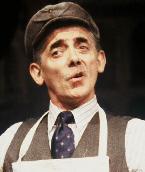SEARCH CurtainUp
REVIEWS
FEATURES
NEWS (Etcetera)
ADDRESS BOOKS
Broadway
Off-Broadway
BOOKS and CDs
OTHER PLACES
Berkshires
London
Los Angeles
Philadelphia
Elsewhere
QUOTES
On TKTS
LETTERS TO EDITOR
FILM
LINKS
MISCELLANEOUS
Free Updates
Masthead
NYC Weather
Pigtown
|
In my day a chip was something you ate on Fridays -- computers -- the pig lays down and the mouse takes over ---Tommy Clock reflecting on the changing of the industrial guard in Limerick where once over 1,000 pigs were slaughtered daily for its internationally famous bacon factories. |

Jarlath Conroy as Tommy Clocks
(Photo: Carol Rosegg ) |
Playwright Mike Finn, himself a Limerick man, conceived his affectionate though not uncritical amalgam of Pigtown stories as a "promenade production" with the audience moving around a large space to different small playing areas where individual stories unfold. As anyone who has been to the Irish Rep knows, it is a modestly proportioned space that requires considerable rethinking of Finn's ambitious concept.
With the help of designer James Morgan, director Charlotte Moore has created a Limerick landscape in the form of a pastel wall mural that leaves the small stage uncluttered and open for the eleven actors to navigate the stage (and occasionally the single aisle) to move back and forth through the decades and in and out of close to two dozen characters. Morgan's comically skewered buildings work well with the expressionistic staging, a stage manager-narrator who pops out of his coffin to have a look back at his own and his fellow Pigtowners' lives, and the broad comedy of some characters who appear regularly, like figures from a weekly newspaper cartoon. In the last category there are three boys representing Limerick's great enthusiasm for sports (David Costelloe, John Keating, Aedin Moloney} and two daffy and inept radio show hosts (the versatile John Keating and Dara Coleman), who at one point give a swimming lesson which we see acted out by their "listeners" and acted upon with a sermon on the sins of nakedness from the local priest.
Tommy Clock's nonlinear narration is not hard to follow since a large hanging clock marked by decades serves as an alternative to title projections. From the opening scene of Tommy's funeral when the hand of the clock is poised to edge forward to 1999, someone always manages to move the clock's hand to the era during which the next story will take place. And as played with quirky charm by Jarlath Conry, Tommy is also easy to like.
While the choice of events and stories stuffed into two hours is remarkably complete, Tommy's stories often seem to be less about real people than types created to characterize Limerick. This applies mostly to the somewhat overdone comic aspects of the play, and leaves it to the darker episodes to provide the emotional highlights.
One of these darker and most powerful episodes gives universality to the plight of a wife (Terry donnelly, once again proving herself to be one of the company's outstanding regulars) abused by a thuggish husband (Anto Nolan). While the family drama unfolds behind a white lace curtain, a local policeman (Declan Mooney), embittered by his helplessness to do anything, shows Tommy Clock his notebook filled with a list of wives stumbling into doors and babies falling out of cribs. "There are parts of this town where the light never shines" he says, adding "and those names never appear in a book--except this. You see the town with sepia-colored glasses." When Tommy protests "You're making it sound like a horrible place", he drily responds "No, I'm making it sound like a city. " A similarly moving, well-written scene involves a Limerick outsider, Elsa (Rosemary Fine handling her monologue with powerful restraint) a Jewish refugee from Vienna's Nazi regime. At sea in "a town filled with pork", she is driven to a starkly dramatic response to Limerick's anti-Semitic comments about her being a Christ killer.
While some trimming of the repetitious comic bits would have avoided dull spots, there's enough lovely writing throughout, to make a visit to Pigtown worthwhile. Tommy Clock, who gets the lion's share of the more memorable one-liners, sums up the play's raison d'être better than anything I could tell you: " Time is stories--stories is people-- time is dog-eared memories creeping like shades across your heart. "
|
PIGTOWN
Written by Mike Finn Directed by Charlotte Moore Cast: Jarlath Conroy as Tommy Clocks; with Dara Coleman, David Costelloe, Terry Donnelly, Rosemary Fine, Laura James Flynn, Christopher Joseph Jones, John Keating, Aedin Moloney, Declan Mooney and Anto Nolan Set Design: James Morgan Costume Design: Robin L. McGee Lighting Design: Kirk Bookman Sound Design: Murmod, Inc. Running time: 2 hours, includes one intermission Irish Repertory Theatre , 132 W. 22nd St (6th/7th Aves), 212/ 727-2737 4/19/02-6/09/02; opening 4/28/02. Tuesday - Saturday evenings at 8 p.m., with Saturday and Sunday matinees at 3 pm-- $35 - $40 Reviewed by Elyse Sommer based on April 27th press preview performance. |

6, 500 Comparative Phrases including 800 Shakespearean Metaphors by CurtainUp's editor.
Click image to buy.
Go here for details and larger image.



